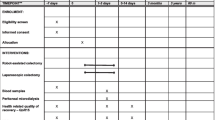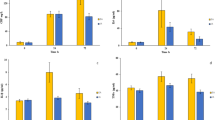Abstract
Background: Laparoscopic procedures in oncological surgery are either done in curative or palliative intent. We present two experiments comparing laparoscopic to conventional surgery in the curative and palliative setting regarding short-term (stress and immune alteration) and long-term aspects (survival time and recurrence rate). Methods: We established two syngenic tumor-bearing small animal models for curative liver resection (Morris hepatoma 3924A, ACI rats) and palliative colon resection (BSp73 ASML, BOX rats). Male rats were operated on, performing laparoscopic and conventional liver resection as well as laparoscopic and conventional colon resection; control groups (anesthesia) were included. The following parameters of the stress and immune system were measured: corticosterone, neopterine, Il-1-b, Il-6, and body weight as a parameter of postoperative recovery. Analyzed long-term parameters were survival time, tumor weight, and recurrence rate (histology). Results: After colon resection, analysis of variance showed significant differences in all short-term parameters, including body weight after laparoscopic versus conventional colon resection (p <0.05). In the case of laparoscopic versus conventional liver resection, only Il-6 showed globally statistically significant differences for the short-term parameters (p = 0.05). Long-term parameters were not significantly different between the laparoscopic and conventional groups, regardless of the type of resection (colon or liver) or the operative setting (curative or palliative). However, there were differences after curative liver resection compared to the control group (anesthesia alone). Conclusion: These results suggest that the type of intraabdominal operation (colon or liver) may influence the degree of trauma of an operation more than the type of technique (laparoscopic or open). The perioperative alteration of stress and immune function has no implications on the long-term results, such as survival time or recurrence, neither in the curative nor in the palliative setting. The thesis that laparoscopic surgery results in less pain, which in turn means less stress and less alteration of the immune system and therefore results in a lower rate of postoperative metastasis is only valid for laparoscopic colonic resection in our model. The part of the thesis that states that fewer metastases should occur after laparoscopic oncological surgery cannot be confirmed in our study.
Similar content being viewed by others
Author information
Authors and Affiliations
Rights and permissions
About this article
Cite this article
Kuntz, C., Kienle, P., Schmeding, M. et al. Comparison of laparoscopic versus conventional technique in colonic and liver resection in a tumor-bearing small animal model. Surg Endosc 16, 1175–1181 (2002). https://doi.org/10.1007/s00464-001-9159-6
Received:
Accepted:
Published:
Issue Date:
DOI: https://doi.org/10.1007/s00464-001-9159-6




